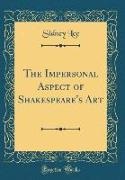Read more
Excerpt from The Impersonal Aspect of Shakespeare's Art
I confine my present inquiry to the plays alone, and I ask, Does Shakespeare reveal himself to us there? I do not mean as Rousseau reveals himself in his Confessions, or as Johnson stands revealed in the pages of Boswell, but, say, as Cicero or Horace, as Burke or Shelley, lift the curtain on dominant predilections and prejudices in published words. Do Shakespeare's plays, like Cicero's or Burke's oratory, declare from time to time his precise likes or dislikes, his definite convictions and prejudices? Do we learn his private Opinions on religion, on politics, and the other matters which more or less occupy every thinking man's attention? From 'personality' I here exclude physical characteristics and biographical details. I am not concerned with the everyday virtues and repugnances which most men of repute share alike. My inquiry is directed to distinguishing idiosyncrasies, to individual characteristics, to peculiar experiences of mind or heart.
At a first glance the theme may look simple enough. An author gives in the written page an expression of what is in him. He can have nothing else to give. Consequently all, it may be thought, one who seeks knowledge of an author's particular personality has to do, is to extract it from the verbal receptacle to which he committed it. But this is a superficial aspect of a highly complex question. There is a quibbling conundrum which asks, How can a thing be lost, when you know where it is and has for answer that the thing is at the bottom of the sea, or in the bottomless crevasse of a mountain. It may or may not be that the question I ask to-night may fairly provoke some such repartee. At any rate the speculation is difficult, and before we part with it, it imposes on us the obligation of glancing at the manner in which poetic genius works, and at the intellectual processes which are more especially involved in the creation of great drama.
About the Publisher
Forgotten Books publishes hundreds of thousands of rare and classic books. Find more at www.forgottenbooks.com
This book is a reproduction of an important historical work. Forgotten Books uses state-of-the-art technology to digitally reconstruct the work, preserving the original format whilst repairing imperfections present in the aged copy. In rare cases, an imperfection in the original, such as a blemish or missing page, may be replicated in our edition. We do, however, repair the vast majority of imperfections successfully; any imperfections that remain are intentionally left to preserve the state of such historical works.

